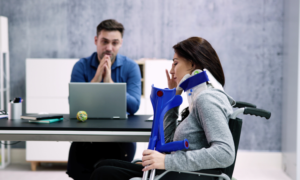Suffering a personal injury can be a profound and disrupting experience, affecting every aspect of your life. From the initial shock and pain to the long journey of recovery, it’s a path filled with challenges. However, with the right support and strategies, overcoming these obstacles is possible. This guide is dedicated to helping individuals navigate the aftermath of personal injury, offering practical advice on physical recovery, emotional resilience, and navigating the legal landscape. Whether it’s seeking the expertise of a Whitby personal injury lawyer, undergoing Shockwave Therapy in Cambridge, or engaging in Spinal Physiotherapy in Owen Sound, this article explores various avenues to aid your recovery process.
Immediate Steps Post-Injury
Seek Medical Attention
Prioritize your health by seeking immediate medical attention. Early assessment and treatment are crucial for recovery.
Document Everything
Keep detailed records of the incident, medical reports, and expenses incurred. This documentation is vital for legal and insurance purposes.
Physical Recovery
Specialist Treatments
Explore specialist treatments relevant to your injury. For musculoskeletal injuries, shockwave therapy in Cambridge offers a non-invasive solution to pain relief and healing.
Rehabilitation
Rehabilitation is a critical component of the recovery journey following a personal injury. Actively participating in specialized rehabilitation programs, like spinal physiotherapy in Owen Sound, can significantly aid in regaining lost function and mobility. These tailored programs are designed by healthcare professionals to meet your specific needs, ensuring a personalized approach to recovery. Through a series of targeted exercises and therapies, spinal physiotherapy, for instance, focuses on strengthening the back muscles, improving posture, and increasing flexibility, all of which are vital for restoring spinal health and enhancing overall well-being. Embracing rehabilitation not only accelerates the healing process but also empowers individuals to achieve optimal physical functionality, paving the way for a smoother and more effective recovery.
Emotional Well-being
Acknowledge Your Feelings
Acknowledging your feelings is an essential step in the healing process, especially in times of distress or after experiencing a significant event. It’s important to recognize and accept the wide spectrum of emotions you might encounter during this period. Understanding that it’s entirely normal to experience a diverse array of feelings, from profound sadness to intense anger, can be crucial for emotional health. These emotions are natural responses to your circumstances and allowing yourself to feel them fully is a key part of coming to terms with your situation. Suppressing or denying your feelings can hinder your recovery, while embracing them can lead to greater self-awareness and emotional resilience. Remember, navigating through your emotions with acceptance and compassion towards yourself is a vital step towards healing and growth.
Seek Support
Seeking support is a vital step in navigating the complexities of emotional recovery. Engaging with a professional therapist or counselor offers a structured and supportive environment where you can explore and understand your feelings with guidance. These professionals are trained to provide strategies and tools that facilitate coping and healing, allowing you to process your emotions in a healthy and constructive manner. Additionally, joining support groups presents an opportunity to connect with individuals who are experiencing similar challenges. Sharing your journey with others who understand can be incredibly comforting and can foster a sense of community and belonging. Whether it’s through one-on-one therapy sessions or group discussions, actively seeking support can significantly aid in your emotional well-being, offering perspectives and companionship that empower you to move forward.
Navigating the Legal Process
Consult a Lawyer
If your injury was due to someone else’s negligence, consulting with a Whitby personal injury lawyer can provide clarity on your legal rights and the steps to compensation.
Understand Your Rights
Familiarize yourself with the legal aspects of personal injury claims. A knowledgeable lawyer can guide you through this process.
Long-term Recovery Strategies
Set Realistic Goals
Work with your healthcare providers to set achievable recovery goals. Celebrate the small milestones along the way.
Adapt Your Lifestyle
Consider lifestyle adjustments that can aid your recovery. This might include dietary changes, exercise modifications, and ergonomic improvements at home or work.
Stay Informed
Keep abreast of new treatments, therapies, and support resources. The field of recovery and rehabilitation is continually evolving.
In conclusion, recovering from a personal injury is undoubtedly challenging, but it’s a journey you don’t have to walk alone. By leveraging medical and legal expertise, embracing physical and emotional healing practices, and drawing on the strength of community and personal resilience, you can navigate the path to recovery more smoothly. Remember, each step forward, no matter how small, is progress. With patience, determination, and the right support, you can work towards reclaiming your health and well-being, emerging stronger on the other side of adversity.
Read More From Techbullion



































